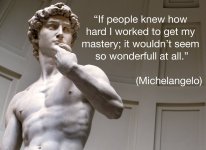In my case--which is not pool--I knew at my 5th grade BD party that I wanted to become an Electrical Engineer, and by 8th grade that I wanted to specialize in digital electronics (this was 1965 before many people even knew computers existed.) in 11th grade I built a calculator (Add and subtract only) about the size of a attaché case which won various science fairs in my state.
In my case, I did not really have a choice of what I wanted to do--but I chose to pursue what I was good at.
By the time I arrived at Carnegie Mellon in 1971 I had built 4 short wave radios, innumerable slot cars, and the calculator. Before my first course in EE at CMU, I had a touchy feely relationship with transistors, tubes, inductors, capacitors and resistors. The first EE class was a large lecture hall filled with about 275 students. An old white haired gentleman walked out on stage and started the lecture as follows::
"We are going to teach you the 2 laws of electrical engineering. If you do not happen to agree with these laws, find them too difficult, or have any other issues with these 2 laws, I suggest you find a different course of study."
And true to his work I spent 4 years learning Kirchhov's voltage and current laws. Linear algebra, differential calculus, integral calculus, differential equations, smith charts, Laplace and Fourier transforms,..... ALL pertaining to those 2 laws. Working innumerable problems.....
On thing special about CMU was the testing procedures--it was all open book--but the tests were designed such that if you had to look up anything other than getting the sign right, that you would spend too much time reading and not enough time writing. Oh, and on each test there was a problem specifically designed to provide insufficient information to be solved. Here the only correct answer was "insufficient information".
Except for being Electrical Engineering it was almost identical to "The Paper Chase" movie.
We lost the class at the first semester boundary, another ¼ of the class at the end of the first year, another ½ the second year, and I graduated in a class of 71 (starting at 275).
{Back to pool}
While in school, I joined a Frat House and played pool for 3-5 hours per day. I got pretty good (at least as good as anyone in my house)
my eye was sharp, my body displined, my mind sharp, and in many respects I could play better in 1975 than today.
Then "life happened" and I did not play for about 35 years. (Not exactly zero but never enough to maintain anything)
Then in 2006 I moved to an area with a local bar that happens to have a couple of bar boxes, and I started playing a bit again. After a year I started to remember how I played back in college, and I dedicated considerable time to playing/practicing pool.
I was unemployed at the time, but not looking for work as I had enough money, so I wandered around the Austin pool scene and ran into some of the better known locals, occasionally getting to play a few games.
The big thing I noticed (this time around) was how much better my understanding of the physics transpiring on the pool table and how much worse my fundamentals and abilities (than when I was back in school) I attribute this to the development of my mental way of analyzing "stuff"
I had developed as I applied myself during my 40 year career in digital electronics. Mental rigor I did not have as a "recent graduate" was now easily available.
So, after screwing around at the bar for a few years, I joined an APA league. I told them I was about a SL6. They started me at 4 and over the course of 7 weeks it went:: 4 -> 7 ->5 ->7 -> 3(bad week) ->5 ->6 where I stayed. realistically when I was playing here I was a 6.4. I ended up getting a job in Ca and quit the APA team.
20 months later I was back in Tx, and found a BCA team. We were a upper mid-rate team and I was about the middlest player on the team.
------------
The point of all of this was::
a) Yes there is natural talent (and not everyone has it)
b) if you have it you still have to develop it and use it constantly to maintain it.
c) if your natural talent is in something other than pool--you are best advised to follow where your talent leads.
In digital electronics I have it. In pool I don't.
